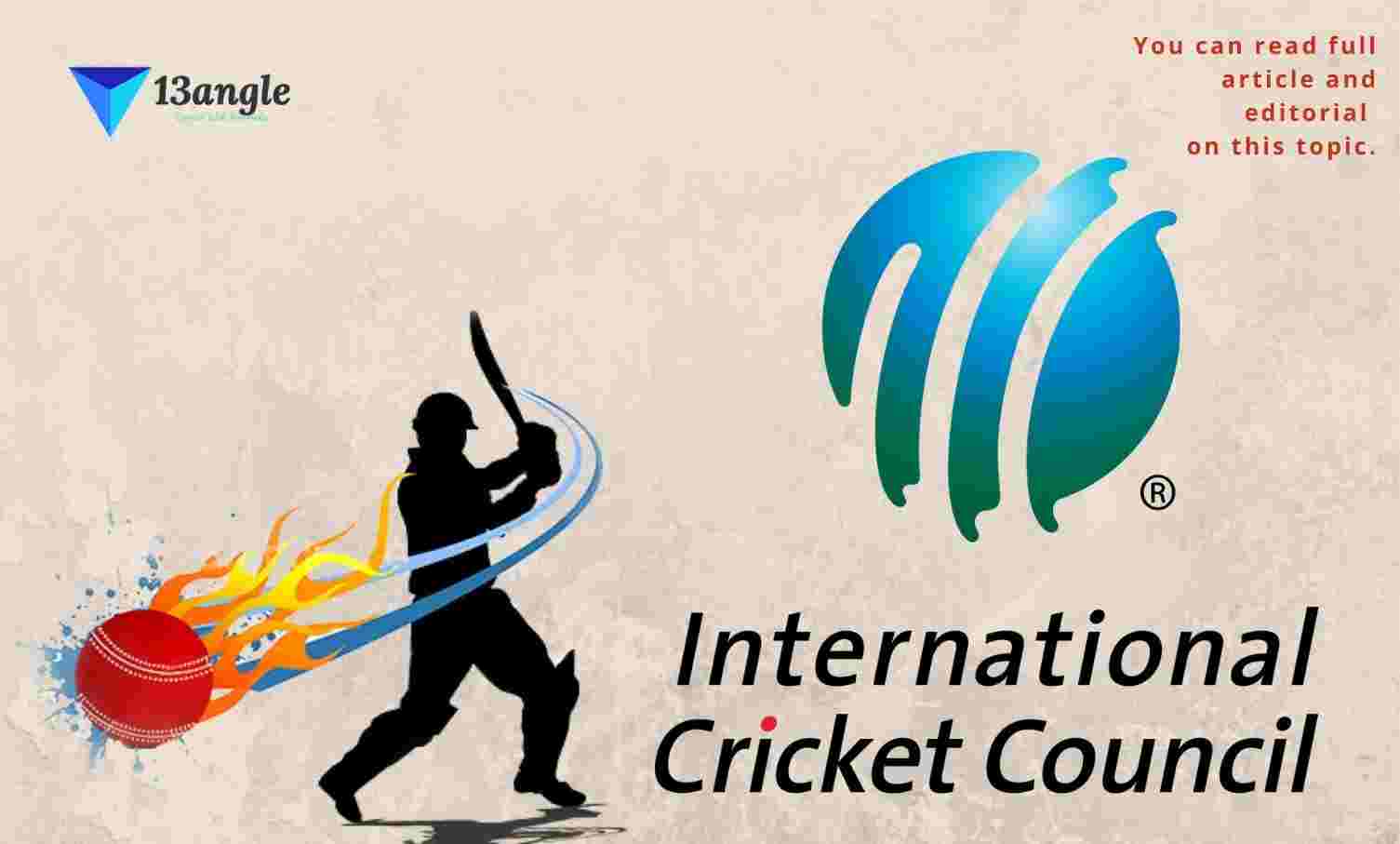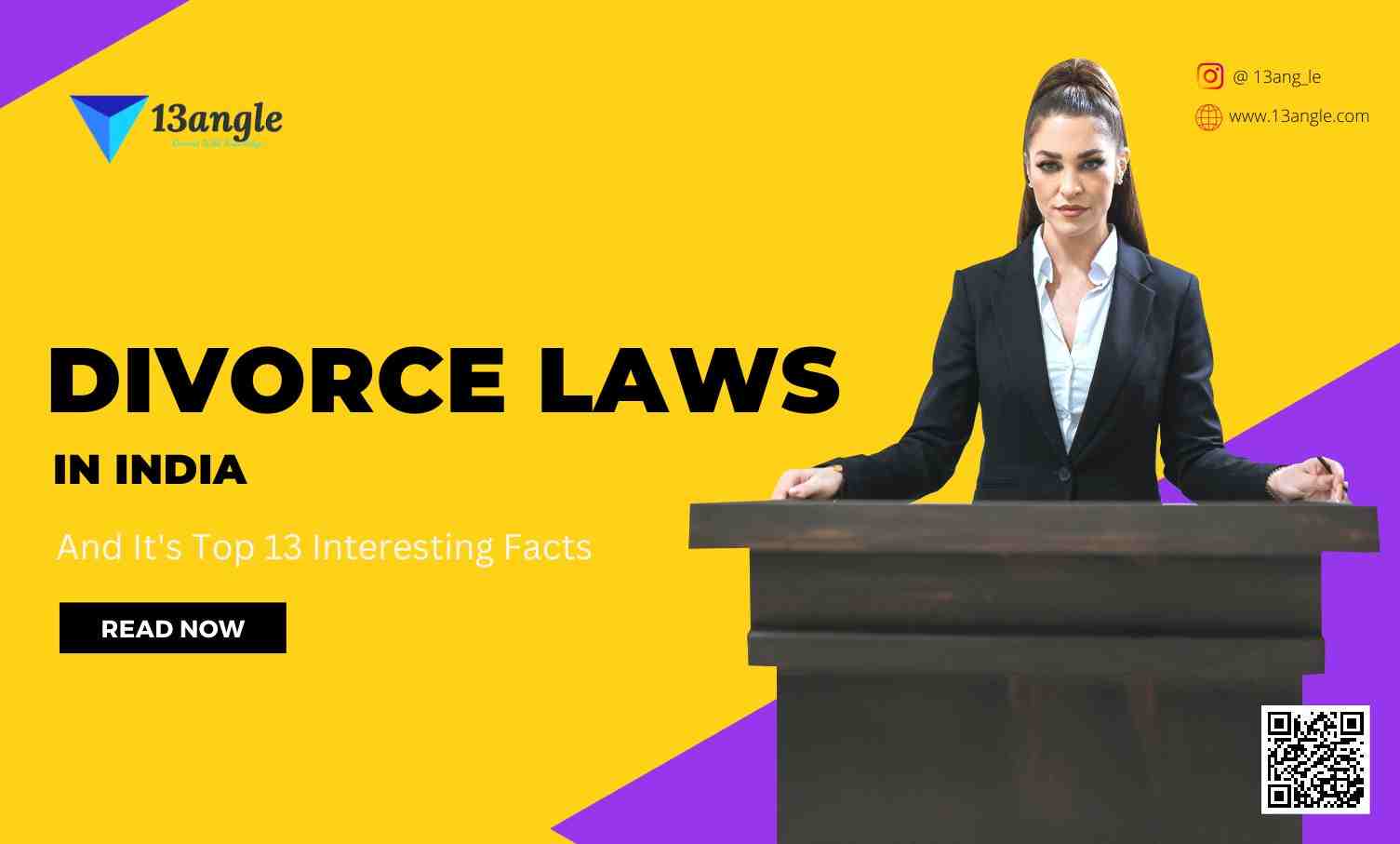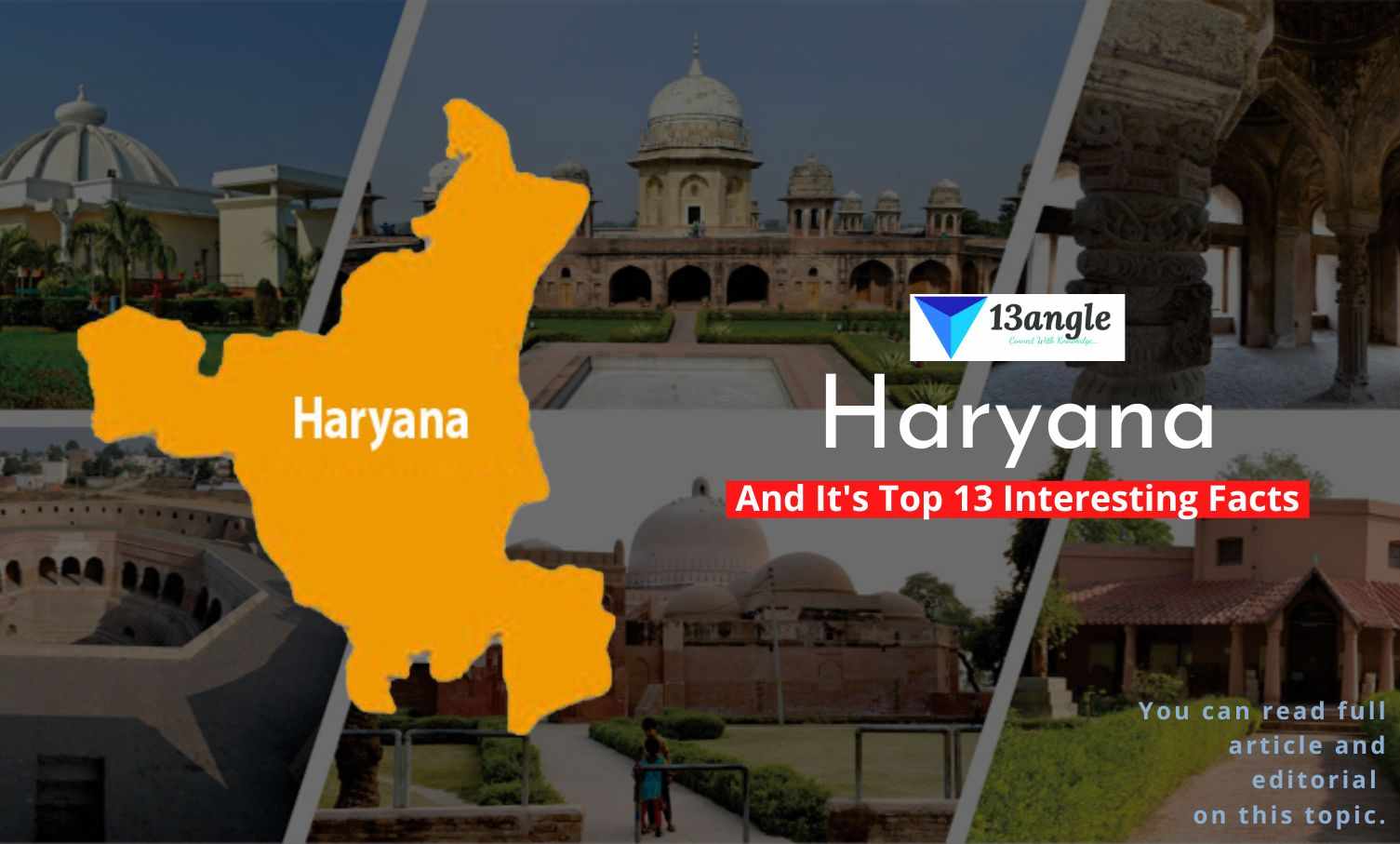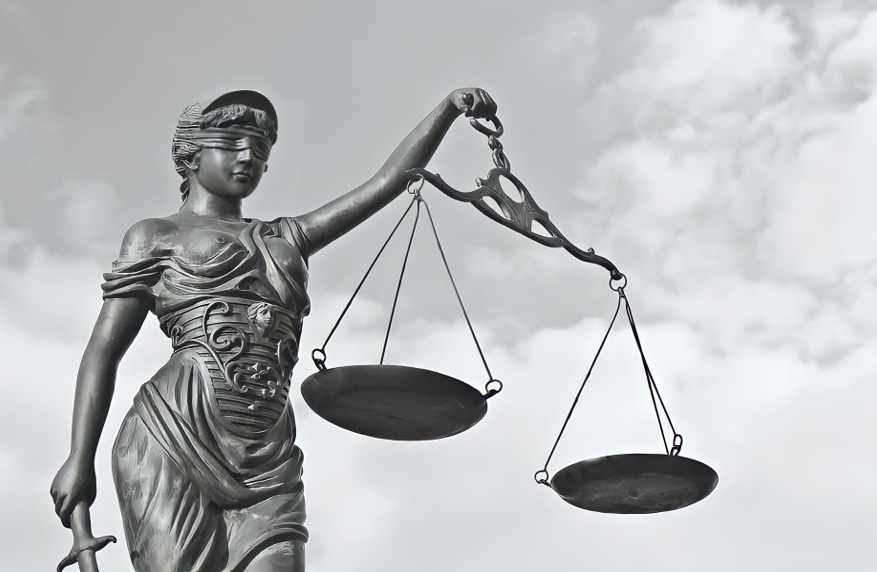
- There are three main organs of the government i.e. The Legislative, The Executive, and The Judiciary. The Administration of justice in India is vested on the judiciary headed by the supreme court of India. Article 124 provides for the establishment of the supreme court in India consisting of a chief justice and other judges.
Introduction

The supreme court is the Apex court in India i.e. highest court. Its decision is binding on all courts and all over India. The supreme court has a supreme judge called the “chief justice of India” i.e CJI and other judges.
- According to Article 124 (1):-
“There shall be a supreme court of India consisting of a chief justice of India and until parliament by law prescribes a larger number of not more than 7 other judges”.
However, in view of the population explosion resulting in an increase in litigation and crime rate, the no of judges is to be increased from time to time. The present no of judges in the supreme court is 27 including CJI.
Qualifications (Article 124 (3))
- According to Article 124(c) of the constitution prescribes the qualifications for the position of the judge in the supreme court. A person to be appointed as the judge of the supreme court possesses the following qualifications.
He / She must be a citizen of India and
He / She has been for at least five years judge Of a High court or of two or more High courts in succession, or
He / She has been for at least 10 years as an advocate of a High court or of two or more High courts in succession; or
He / She is in the opinion of the president, a distinguished jurist. A person to be appointed as a judge of the supreme court must possess the two qualifications i.e must be a citizen of India and must possess either of the qualifications mentioned in clauses (b) and (d).
Appointment Of Chief Justice Of India
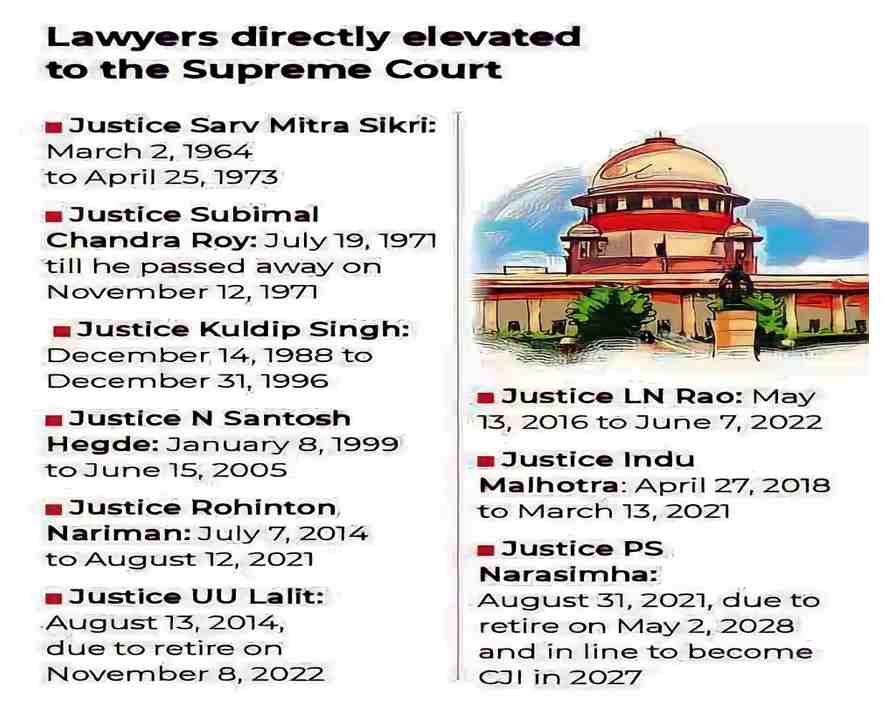
The president under Article 124 (2) of the constitution has empowered to appoint the chief justice of India on his / her own without consulting anyone/authority.
In terms of the CJI, the retiring CJI proposes his successor. The suggestion is forwarded by the Union Law Minister to the Prime Minister, who then advises the president.
The practice is to appoint the senior judge of the supreme court as the chief justice of India.
However during Mrs. Indira Gandhi’s tenure as PM, this was revoked, On 25th April 1973 justice A. N Ray, the then judge, of the supreme court was appointed as CJI superseding 3 judges, who were seniors to justice A.N.Ray as the chief justice of India. It gave room for a lot of controversies and the Supreme Court of the Bar Association condemned the appointment of 3 other judges namely Justice shelat, justice Hedge, and Justice Groven tendered resignations to their posts in protest of out weighting their seniority.
The government justified its action on the grounds of _
- under Article 124 of the constitution of India has absolute discretion to appoint anyone whom he finds suitable for the post of chief justice of India
- The Law Commission, in appointing the CJI suggested merit should be judged not only seniority of main consideration and the government followed the recommendation.
- The Executive should take into consideration the mental outlook or social philosophy of judges.
- In 1977, the Janata party won the election with a huge majority and revived the old practice of appointing the chief justice of the supreme court based on seniority. Though it is an old rule, will ensure the independence of the Judiciary.
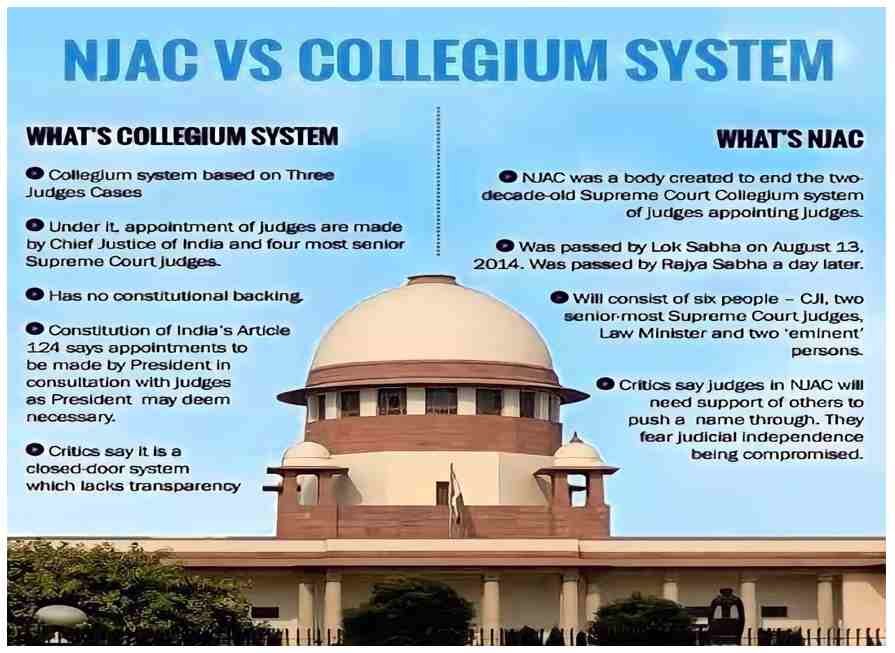
In S.C Advocate- on – Record Association v. Union of India (1993) The nine-judge bench of the supreme court overruled the S.P Gupta judgment.
It held that in issues regarding the appointment of judges in the higher judiciary the opinion of the CJI must be given primacy to minimize the executive influence in the judicial functions.
The court expanded the scope of the word ‘consultation ‘ by constructing it in equivalent terms with ‘ concurrence ‘. The appointment of the CJI of India shall be based on seniority.
Powers And Functions Of CJI
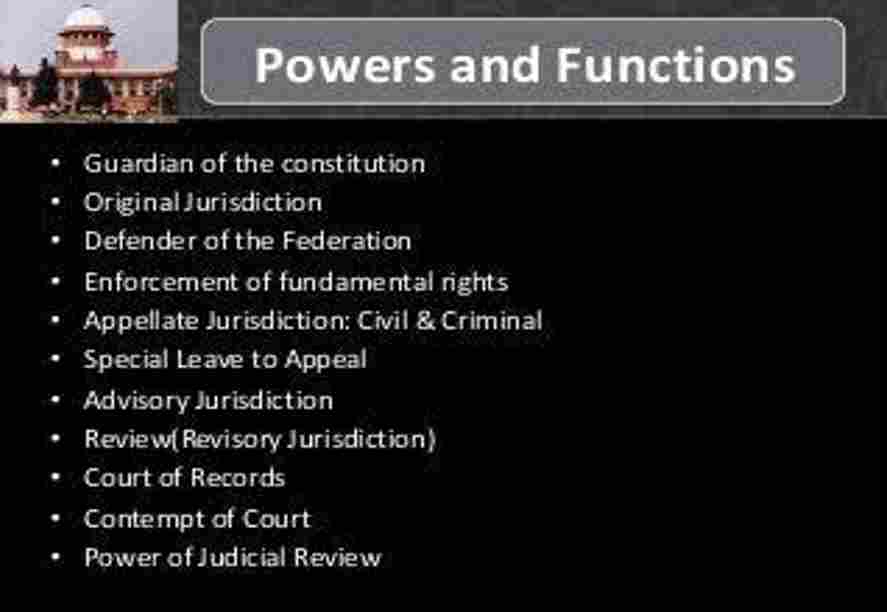
The Chief Justice oversees allocating cases and appointing constitutional benches that deal with key legal issues as leader of the Supreme Court.
CJI delegates all duties to the other justices in line with Article 145 of the Constitution and the Supreme Court Rules of Procedure of 1966.
The CJI is responsible for the following administrative tasks:
- Maintenance of the roster; appointment of court officials;
- Other general and incidental topics concerning the Supreme Court’s supervision and operation.
Master of the Roster
The term ‘Master of the Roster’ refers to the Chief Justice’s ability to form Benches to hear cases.
The Chief Justice of India, Dipak Misra, and a Constitution Bench stated in November 2017 that “the Chief Justice is the master of the roster and he alone has the right to construct the Benches of the Court and allot matters to the Benches thus established.”
- Swearing in of the president and governors.
- Advisory power; CJI can instruct and advise the government to work on certain issues.
- Acting president and vice president; Discharge the role of president if the office of president and vice president suddenly becomes vacant in emergency situations.
- If there is confusion about constitutional provisions, the only valid interpretation is the one given by the Supreme Court.
- Assist the President in the appointment of judges in the Supreme Court and the High Courts.
Term Of Office
- The judge of the supreme court holds office till he attains the age of 65 years. No minimum age is prescribed for appointment as a judge of the supreme court nor any fixed period of office. Once appointed a judge of the supreme court may cease to be so on the happening of;
- attaining age of 65 years; or
- resigning from his office by writing; or
- being removed by the President.
- In Madras High Court Advocates Association v. Dr. A. S Anand, Hon’ble chief justice of India (AIR 2001) it has been held that no writ lies for determining the age of the judge.
Salary And Allowances
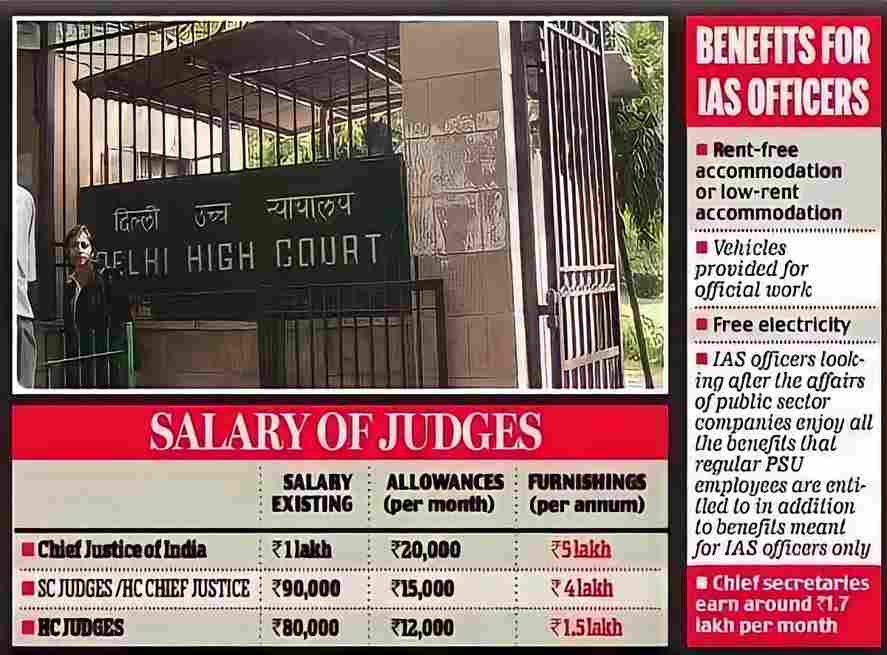
Salaries and Allowances of judges constitute an important part of the charged expenditure from the Consolidated Fund of India as well as the funds of the respective States.
Because through the courts the judges act as an interpreter and custodians of the constitution of India.
Article 125 of the constitution deals with this _
There shall be paid to the judges of the supreme court such salaries as may be determined by Parliament by law and, until provision in that behalf is so made, such salaries as specified in the second schedule.
Every judge shall be entitled to such privileges and allowances and to such rights in respect of leave of absence and pension as may from time to time be determined by or under law made by parliament and, until so determined, to such privileges, allowances, and rights as are specified in the second schedule.
The salary of the Chief Justice of India was raised from 1 lakh to 2.80 lakh per month in 2018, while the salary of a judge was raised from 90,000 to 2.50 lakh per month.
They are also given a sumptuary allowance (granted to various grades of personnel in the Central Government, to compensate for the expenditure incurred on entertaining visitors) and free housing, as well as other benefits like medical care, a car, and a phone.
Retired chief justices and judges are entitled to a monthly pension of 50% of their final received pay.
Removal Of CJI
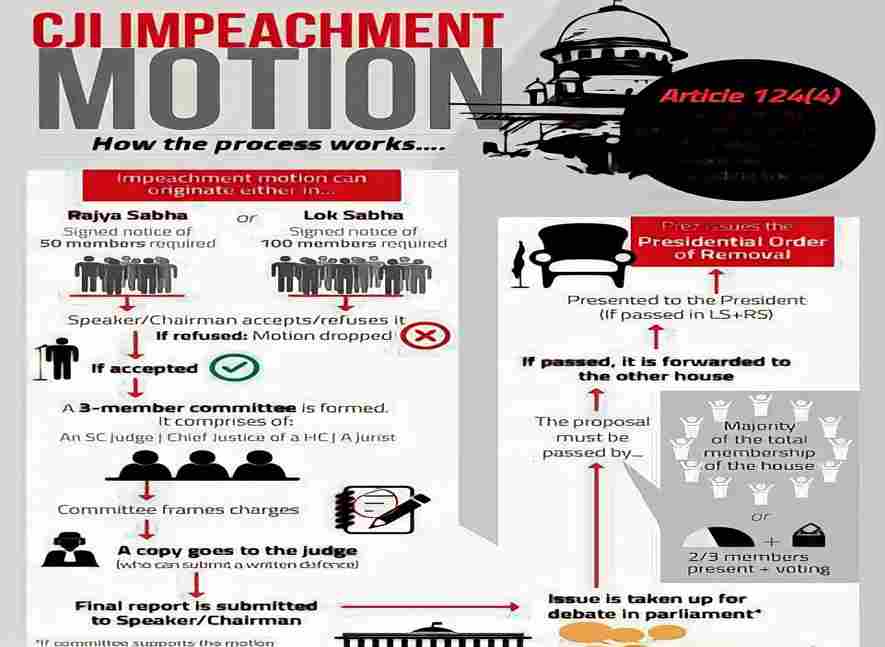
The Constitution of India also provides a set of regulations for the removal of the Supreme Court judge. Article 124(4) mentions those Removal regulations of the Supreme court judge as follows:
“A judge of the Supreme Court shall not be removed from his office except by an order of the President passed after an address by each House of Parliament supported by a majority of the total membership of that House and by a majority of not less than two-thirds of the members of that House present and voting has been presented to the president in the same session for such removal on the ground of proved misbehavior or incapacity “.
Clause (5) of Article 124 of the constitution provides that parliament may by law regulate the procedure for the presentation of an address and for the investigation and proof of the misbehavior or incapacity of a judge under clause (4).
Prohibition Of Practice
- According to Article 124 (7) of the constitution, no person who has held office as a judge of the supreme court shall plead or act in any court or before any authority within the territory of India. However, as per Article 128 of the constitution, a retired judge may at any time hold the office of a judge when requested by the chief justice of India with the consent of the president and he consents so to do.
Appointment Of Acting Chief Justice
- Article 126 of the Indian constitution provides that when the office of the chief justice of India is vacant on when the chief justice is, by reason of absence or otherwise, unable to perform the duties of his office, the duties of the office shall be performed by such one of the other judges of the court as the president may appoint for the purpose.
Ad- HOC Judges (Article 127)
Clause (1) of Article 127 provides that if at any time there should not be a quorum of the judges available to hold or continue any session of the court, the chief justice may, with the previous consent of the President and after consultation with the chief justice of the High court concerned, request in writing, a judge of a High court to act as ad-hoc judge in the supreme court, for such period as may be necessary. The judge so appointed should be qualified to be appointed as a judge of the supreme court.
While so attending and acting as ad-hoc judge, the judge shall the jurisdiction, powers, and privileges of a judge of the supreme court. The ad-hoc judge shall attend the sitting of the court in priority to other duties of his office at the time and for the period for which his attendance is required.
List Of CJIs
- The CJIs till now worked in the supreme court are as follows.
| Name | Tenure | High Court | President |
| Harilal Jekisundas Kania (1890–1951) | 26th January 1950 To 6th November 1951 | Bombay High Court | Rajendra Prasad |
| Mandakolathur Patanjali Sastri (1889–1963) | 7th November 1951 To 3rd January 1954 | Madras High Court | Rajendra Prasad |
| Mehr Chand Mahajan (1889–1967) | 4th January 1954 To 22 December 1954 | Lahore High Court | Rajendra Prasad |
| Bijan Kumar Mukherjea (1891–1956) | 23rd December 1954 To 31st January 1956 | Calcutta High Court | Rajendra Prasad |
| Sudhi Ranjan Das (1894–1977) | 1st February 1956 To 30th September 1959 | Calcutta High Court | Rajendra Prasad |
| Bhuvaneshwar Prasad Sinha (1899–1986) | 1st October 1959 To 31st January 1964 | Patna High Court | Rajendra Prasad |
| Pralhad Balacharya Gajendragadkar (1901–1981) | 1st February 1964 To 15th March 1966 | Bombay High Court | Sarvepalli Radhakrishnan |
| Amal Kumar Sarkar (1901–2001) | 16th March 1966 To 29th June 1966 | Calcutta High Court | Sarvepalli Radhakrishnan |
| Koka Subba Rao (1902–1976) | 30th June 1966 To 11th April 1967 | Madras High Court | Sarvepalli Radhakrishnan |
| Kailas Nath Wanchoo (1903–1988) | 12th April 1967 To 24th February 1968 | Allahabad High Court | Sarvepalli Radhakrishnan |
| Mohammad Hidayatullah (1905–1992) | 25th February 1968 To 16th December 1970 | Bombay High Court | Zakir Husain |
| Jayantilal Chhotalal Shah (1906–1991) | 17th December 1970 To 21st January 1971 | Bombay High Court | V. V. Giri |
| Sarv Mittra Sikri (1908–1992) | 22nd January 1971 To 25th April 1973 | Lahore High Court | V. V. Giri |
| Ajit Nath Ray (1912–2009) | 26th April 1973 To 27th January 1977 | Calcutta High Court | V. V. Giri |
| Mirza Hameedullah Beg (1913–1988) | 29th January 1977 To 21st February 1978 | Allahabad High Court | Fakhruddin Ali Ahmed |
| Yeshwant Vishnu Chandrachud (1920–2008) | 22nd February 1978 To 11th July 1985 | Bombay High Court | Neelam Sanjiva Reddy |
| Prafullachandra Natwarlal Bhagwati (1921–2017) | 12th July 1985 To 20th December 1986 | Gujarat High Court | Zail Singh |
| Raghunandan Swarup Pathak (1924–2007) | 21st December 1986 To 18th June 1989 | Allahabad High Court | Zail Singh |
| E. S. Venkataramiah (1924–1997) | 19th June 1989 To 17th December 1989 | Karnataka High Court | Ramaswamy Venkataraman |
| Sabyasachi Mukharji (1927–1990) | 18th December 1989 To 25th September 1990 | Calcutta High Court | Ramaswamy Venkataraman |
| Ranganath Misra (1926–2012) | 26th September 1990 To 24th November 1991 | Orissa High Court | Ramaswamy Venkataraman |
| Kamal Narain Singh (1926–) | 25th November 1991 To 12th December 1991 | Allahabad High Court | Ramaswamy Venkataraman |
| Madhukar Hiralal Kania (1927–2016) | 13th December 1991 To 17th November 1992 | Bombay High Court | Ramaswamy Venkataraman |
| Lalit Mohan Sharma (1928–2008) | 18th November 1992 To 11th February 1993 | Patna High Court | Shankar Dayal Sharma |
| M. N. Rao Venkatachaliah (1929–) | 12th February 1993 To 24th October 1994 | Karnataka High Court | Shankar Dayal Sharma |
| Aziz Mushabber Ahmadi (1932–) | 25th October 1994 To 24th March 1997 | Gujarat High Court | Shankar Dayal Sharma |
| Jagdish Sharan Verma (1933–2013) | 25th March 1997 To 17th January 1998 | Madhya Pradesh High Court | Shankar Dayal Sharma |
| Madan Mohan Punchhi (1933–2015) | 18th January 1998 To 9th October 1998 | Punjab and Haryana High Court | K. R. Narayanan |
| Adarsh Sein Anand (1936–2017) | 10th October 1998 To 31st October 2001 | Jammu and Kashmir High Court | K. R. Narayanan |
| Sam Piroj Bharucha (1937–) | 1st November 2001 To 5th May 2002 | Bombay High Court | K. R. Narayanan |
| Bhupinder Nath Kirpal (1937–) | 6th May 2002 To 7th November 2002 | Delhi High Court | K. R. Narayanan |
| Gopal Ballav Pattanaik (1937–) | 8th November 2002 To 18th December 2002 | Orissa High Court | A. P. J. Abdul Kalam |
| Vishweshwar Nath Khare (1939–) | 19th December 2002 To 1st May 2004 | Allahabad High Court | A. P. J. Abdul Kalam |
| S. Rajendra Babu (1939–) | 2nd May 2004 To 31st May 2004 | Karnataka High Court | A. P. J. Abdul Kalam |
| Ramesh Chandra Lahoti (1940–2022) | 1st June 2004 To 31st October 2005 | Madhya Pradesh High Court | A. P. J. Abdul Kalam |
| Yogesh Kumar Sabharwal (1942–2015) | 1st November 2005 To 13th January 2007 | Delhi High Court | A. P. J. Abdul Kalam |
| K. G. Balakrishnan (1945–) | 14th January 2007 To 12th May 2010 | Kerala High Court | A. P. J. Abdul Kalam |
| Sarosh Homi Kapadia (1947–2016) | 12th May 2010 To 28th September 2012 | Bombay High Court | Pratibha Patil |
| Altamas Kabir (1948–2017) | 29th September 2012 To 18th July 2013 | Calcutta High Court | Pranab Mukherjee |
| P. Sathasivam (1949–) | 19th July 2013 To 26th April 2014 | Madras High Court | Pranab Mukherjee |
| Rajendra Mal Lodha (1949–) | 27th April 2014 To 27th September 2014 | Rajasthan High Court | Pranab Mukherjee |
| Handyala Lakshminarayanaswamy Dattu (1950–) | 28th September 2014 To 2nd December 2015 | Karnataka High Court | Pranab Mukherjee |
| Tirath Singh Thakur (1952–) | 3rd December 2015 To 3rd January 2017 | Jammu and Kashmir High Court | Pranab Mukherjee |
| Jagdish Singh Khehar (1952–) | 4th January 2017 To 27th August 2017 | Punjab and Haryana High Court | Pranab Mukherjee |
| Dipak Misra (1953–) | 28th August 2017 To 2nd October 2018 | Orissa High Court | Ram Nath Kovind |
| Ranjan Gogoi (1954–) | 3rd October 2018 To 17th November 2019 | Guwahati High Court | Ram Nath Kovind |
| Sharad Arvind Bobde (1956–) | 18th November 2019 To 23th April 2021 | Bombay High Court | Ram Nath Kovind |
| Nuthalapati Venkata Ramana (1957–) | 24th April 2021 To 26th August 2022 | Andhra Pradesh High Court | Ram Nath Kovind |
| Uday Umesh Lalit (1957–) | 27 August 2022 To Present | Bar Council | Droupadi Murmu |
Top 13 Interesting Facts About CJIs
The Chief Justice of India, or Chief Justice of the Republic of India, is the Supreme Court of India’s chief judge and the highest-ranking officer in the Indian federal judiciary. CJI is also called Master of the Roster.
The first supreme court was established on 26th Jan 1950 and came into existence, starting its sittings on 28th Jan 1950. The supreme court is in Tilak Marg, New Delhi. It succeeded the Federal Court of India, established under the Government of India Act, of 1935.
The First CJI of India is Justice Harilal Jekisundas Kania from 26th January 1950 to 6th November 1951.
The 50th and present chief justice of India is Dhananjaya Y. Chandrachud appointed on 9th Nov 2022.
The CJI can be removed from his office by the procedure mentioned under Article 124 (4) or the impeachment process only.
The Chief justice of India and other judges of the supreme court are appointed by the president under clause (2) of Article 124.
Justice Fathima Beevi became the first woman judge of the Supreme Court in 1989.
The qualifications to become CJI of India is he/she must be a citizen of India and must serve as a judge of the high court for at least 5 years or an advocate for 10 years or he/she must be a distinguished jurist in the president’s judgment.
Kamal Narain Singh, the 22nd chief justice, is the shortest-serving, for 17 days and Yeshwant Vishnu Chandrachud, the 16th chief justice, is the longest-serving chief justice, serving over seven years.
The CJI Is responsible for allocating cases of cases to the Supreme Court Judges and also appoints judicial and constitutional benches to deal with important legal matters.
The outgoing CJI often recommends the next appointed CJI to the President as per the seniority principle.
The salary and allowances of CJI and judges are given from the consolidated fund of India as well as the funds of the respective states.
The person who worked as CJI is prohibited from practice within the territory of India after retirement as CJI mentioned under Article 124 (7) however Article 128 of the constitution provides an exception.

